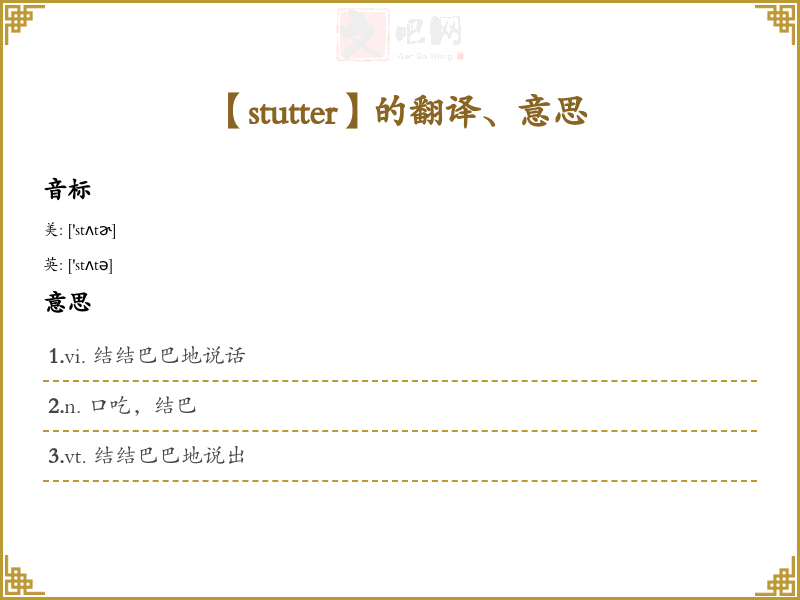【stutter】的翻译、意思
时间: 2025-04-27 03:21:02
【stutter】怎么读
美:['stʌtɚ]
英:['stʌtə]
【stutter】是什么意思、字义解释
1. vi. 结结巴巴地说话
2. n. 口吃,结巴
3. vt. 结结巴巴地说出
【stutter】等级考试
TEM4 ( stuttering, stuttered, stutters )
【stutter】的详细解释
英文单词学*与分析:[stutter]
1. 基本定义:
- 字面意思:stutter(口吃)是指说话时出现重复或延迟的现象,通常表现为发音不流畅。
- 词性:动词和名词。
2. 词源与起源:
-
词源分析:stutter 源于中世纪英语中的“stutten”,可能与古英语的“stut”有关,意为“犹豫不决”或“发音不清”。
-
历史背景:该词的首次记录可以追溯到1*世纪,最早文献中提到的口吃现象。
-
课本:
- 在*的英语教材中,stutter 可能出现在初中或高中阶段的语言学单元。
- 牛津和美国的标准教材中,通常在语言障碍、心理学或演讲技巧的章节中出现,适合高中生。
3. 使用场景:
-
正式与非正式语境:
- 在正式的医学或心理学讨论中,stutter 通常用于描述一种语言障碍。
- 例如:“Stuttering is often treated with speech therapy.”(口吃通常通过语言治疗来治疗。)
- 在非正式的交流中,可能用来描述某人的说话风格。
- 例如:“He tends to stutter when he's nervous.”(他在紧张时常常口吃。)
-
特殊场合:
- 在法律领域,口吃可能影响证人的证词清晰度。
- 在艺术领域,口吃可能成为角色塑造的一部分,表现角色的心理状态。
- 例如:“The character's stutter added depth to his portrayal of anxiety.”(这个角色的口吃为他焦虑的表现增添了深度。)
4. 示例句子:
-
He has a stutter that makes it hard for him to speak in public.
- 他有口吃,这让他在公共场合很难说话。
-
The therapist helped her overcome her stutter through practice.
- 治疗师通过练*帮助她克服了口吃。
-
Children who stutter may feel self-conscious in social situations.
- 有口吃的小孩在社交场合可能会感到自卑。
-
During the interview, he started to stutter when asked difficult questions.
- 在面试中,当被问及难题时,他开始口吃。
-
She learned techniques to manage her stutter effectively.
- 她学会了有效控制自己口吃的技巧。
5. 同义词与反义词:
-
同义词:
- stammer:通常指发音不流畅,可能表现为短暂的停顿和重复。
- hesitate:虽然不完全相同,但都涉及说话时的犹豫。
-
反义词:
- speak fluently(流利地说):表示没有口吃,表达清晰流畅。
. 学方法:
- 音标记忆法:stutter /ˈstʌtər/。可以通过反复朗读音标来记忆发音。
- 词根记忆法:stutter 中的“stut”可以联想到“停滞”,而口吃常常是由于说话时的停滞。
- 谐音联想记忆:可以联想“死他”的发音,想象一个人在说话时“死”停在某个字上,来帮助记忆。
7. 关联词汇:
- speech(言语)
- therapy(治疗)
- nervousness(紧张)
- communication(交流)
- anxiety(焦虑)
通过以上分析,学*者可以更全面地理解“stutter”这个单词的用法、背景和相关知识。
【stutter】例句
1、[[usu sing]] If someone has a stutter, they find it difficult to say the first sound of a word, and so they often hesitate or repeat it two or three times. 口吃
-
例:He spoke with a pronounced stutter.他说话带有明显的口吃。
2、[V-I] If someone stutters, they have difficulty speaking because they find it hard to say the first sound of a word. 结结巴巴地说话
-
例:I was trembling so hard, I thought I would stutter when I spoke.我那时抖得很厉害,我觉得说话时都会结结巴巴。
3、[N-UNCOUNT] stuttering 口吃
-
例:He had to stop talking because if he'd kept on, the stuttering would have started.他不得不停止讲话,因为如果他继续下去,口吃就会发作。
